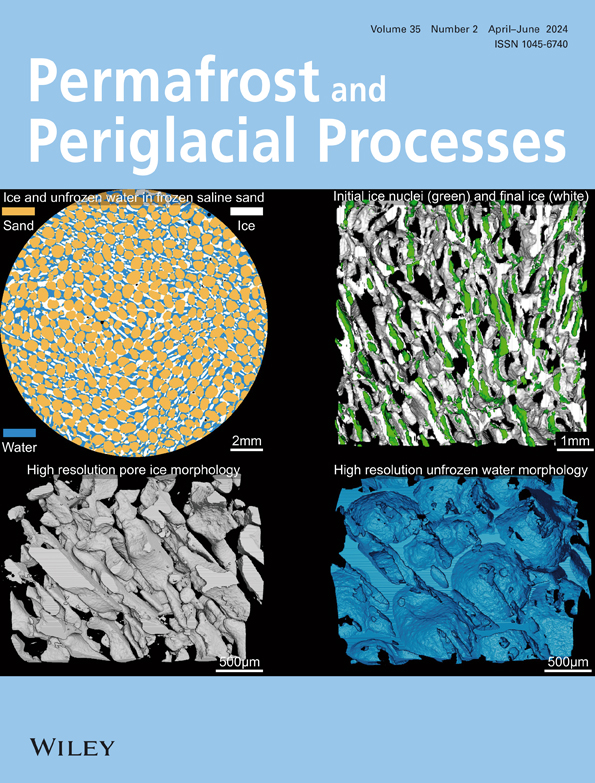Hugh French memorial for Permafrost and Periglacial Processes
IF 3.3
3区 地球科学
Q2 GEOGRAPHY, PHYSICAL
引用次数: 0
Abstract
Two years after the sad and sudden loss of Professor Hugh M. French (May 11, 2019), we commemorate his scientific life, leadership, and friendship with this special issue of Permafrost and Periglacial Processes (PPP), the journal that he founded in 1990 and edited for almost 16 years until 2006. This is the second such issue in his honour, because volume 16 number 1 appeared in 2005 on the occasion of his retirement from the University of Ottawa, where he taught and carried out research from 1967 until 2003. This special issue examines some of the topics particularly dear to Hugh within areas of the world that he loved, such as the Canadian Arctic (Figure 1), the UK, and China. During his long career, Hugh wrote more than 160 papers covering many periglacial and permafrost topics. He adeptly incorporated his knowledge and field experience in The Periglacial Environment, his well-known and much-used textbook, which ran to four editions published in 1976, 1996, 2007, and 2017. While he particularly focused on ground ice and cryostratigraphy, he made substantial contributions to topics such as thermokarst processes and landforms (Figure 2), frost mounds, slope processes and pediments, periglacial involutions, and weathering processes and related landforms including in hot deserts such as in Australia (Figure 3). His interest in Quaternary environments started during his early research in the UK and continued throughout his life, with analyses of deposits and relict landforms in many parts of the world, including the eastern USA, Europe, China and Antarctica. Hugh also worked on engineering problems in permafrost areas, especially in the Canadian Arctic, including those related to oil exploratory drilling and disposal of drilling fluids. He wrote conceptual papers, especially about periglacial environments and geomorphology and geocryology, and also assessed the scientific lives of the pioneering permafrost scientists such as J. R. Mackay and S. Taber. Given the great variety of topics to which Hugh contributed, we start this special issue with the broad field of conceptual and historical papers.休·弗伦奇永久冻土和冰缘过程纪念馆
休·m·弗兰奇教授突然不幸去世两年后(2019年5月11日),我们以本期《永久冻土和冰缘过程》特刊纪念他的科学生涯、领导能力和友谊。他于1990年创办了该杂志,并在2006年之前编辑了近16年。这是他的第二次这样的问题,因为第16卷第1号出现在2005年的时候,他从渥太华大学退休,他在那里教书和从事研究从1967年到2003年。本期特刊探讨了休在他热爱的世界各地特别喜欢的一些话题,比如加拿大的北极(图1)、英国和中国。在他漫长的职业生涯中,休写了160多篇论文,涵盖了许多冰缘和永久冻土主题。他熟练地将自己的知识和实地经验融入到他的著名和广泛使用的教科书《冰缘环境》中,该书于1976年、1996年、2007年和2017年出版了四版。虽然他特别关注地面冰和冰冻地层学,但他对热岩溶过程和地貌(图2)、霜丘、斜坡过程和山墙、冰缘内联、风化过程和相关地貌(包括澳大利亚等炎热沙漠)等主题做出了重大贡献(图3)。他对第四纪环境的兴趣始于他在英国的早期研究,并一直持续到他的一生。对世界上许多地方的沉积物和遗迹地貌进行了分析,包括美国东部、欧洲、中国和南极洲。休还研究了永久冻土区的工程问题,特别是在加拿大北极地区,包括与石油勘探钻井和钻井液处理有关的问题。他写了一些概念性的论文,特别是关于冰缘环境、地貌学和冻土学的论文,他还评估了j·r·麦凯和s·塔伯等冻土科学家的科学生涯。鉴于休贡献的主题种类繁多,我们从概念和历史论文的广泛领域开始这期特刊。
本文章由计算机程序翻译,如有差异,请以英文原文为准。
求助全文
约1分钟内获得全文
求助全文
来源期刊
CiteScore
9.70
自引率
8.00%
发文量
43
审稿时长
>12 weeks
期刊介绍:
Permafrost and Periglacial Processes is an international journal dedicated to the rapid publication of scientific and technical papers concerned with earth surface cryogenic processes, landforms and sediments present in a variety of (Sub) Arctic, Antarctic and High Mountain environments. It provides an efficient vehicle of communication amongst those with an interest in the cold, non-glacial geosciences. The focus is on (1) original research based on geomorphological, hydrological, sedimentological, geotechnical and engineering aspects of these areas and (2) original research carried out upon relict features where the objective has been to reconstruct the nature of the processes and/or palaeoenvironments which gave rise to these features, as opposed to purely stratigraphical considerations. The journal also publishes short communications, reviews, discussions and book reviews. The high scientific standard, interdisciplinary character and worldwide representation of PPP are maintained by regional editorial support and a rigorous refereeing system.

 求助内容:
求助内容: 应助结果提醒方式:
应助结果提醒方式:


